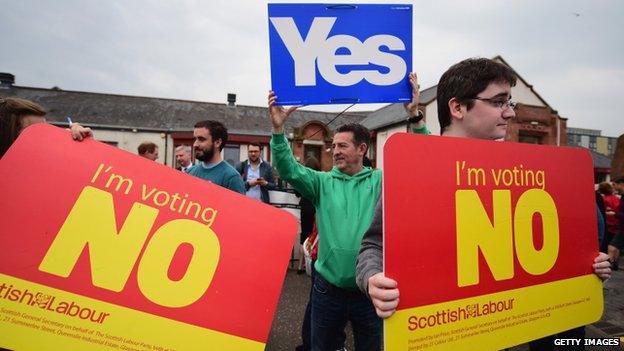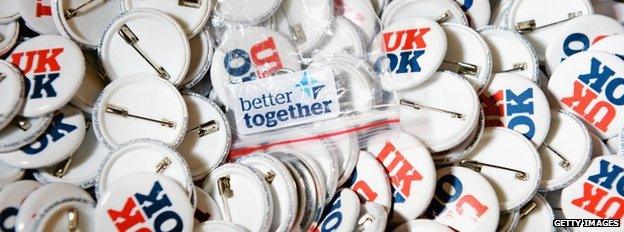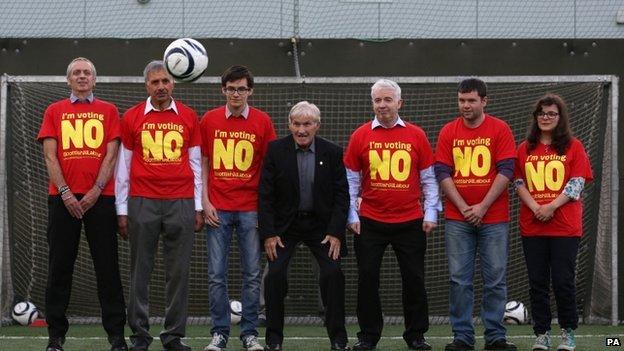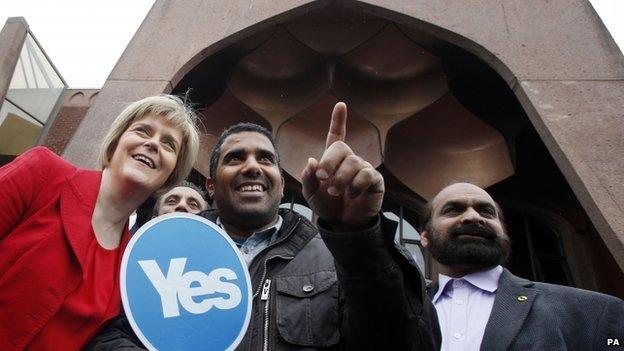Scottish independence: Timetable on new Scots powers to be outlined 'in days'
- Published

The two sides are entering their final 10 days of campaigning
UK Chancellor George Osborne has promised a timetable for further devolution if voters in Scotland reject independence at the ballot box.
The pledge came on the day a YouGov poll suggested the Yes Scotland campaign for independence had taken a narrow lead.
Mr Osborne told the BBC a "plan of action" on more powers would be detailed in the coming days.
Alex Salmond said new proposals at this stage would lack credibility.
Speaking on the BBC's Andrew Marr show, Conservative Mr Osborne said: "You will see in the next few days a plan of action to give more powers to Scotland; more tax powers, more spending powers, more powers over the welfare state.
George Osborne said an action plan would provide ''the best of both worlds''
Alex Salmond: ''The whole Westminster elite are losing the referendum campaign''
"That will be put into effect the moment there is a 'No' vote in the referendum."
He said this would give Scotland the "best of both worlds" by avoiding what he called "the risks of separation" but having "more control over their own destiny".
Voters in Scotland go to the polls on Thursday, 18 September, when they will be asked the "Yes/No" question: "Should Scotland be an independent country?"
Speaking on Sunday evening, Labour leader Ed Miliband said the process of further devolution should get under way "right after the referendum", in the event that independence is rejected.
But speaking to BBC Scotland's Sunday Politics, Scotland's first minister said: "Are we expected to believe, after hundreds of thousands have already voted, that there's a radical new deal?
"This is a panicky measure made because the 'Yes' side is winning on the ground. They're trying to bribe us, but it won't work as they have no credibility left."


Scottish Labour - Its devolution commission, external has backed increased tax-varying powers and control over some elements of welfare and benefits policy. It said MSPs should be able to vary tax by up to 15p, giving them the option of restoring the 50p rate for top earners. They would also be able to cut the 45p rate but only if the basic rate was cut as well.
Scottish Conservative - Scottish Conservative leader Ruth Davidson has said Scotland should be given full income tax powers, a key recommendation of the party's devolution commission, external, chaired by Lord Strathclyde. The commission, which said the income tax plan would see the Scottish Parliament accountable for 40% of the money it spent, also said there was a case for a share of Scottish VAT receipts being assigned to Holyrood.
Scottish Liberal Democrats - Its commission, chaired by former UK party leader Sir Menzies Campbell, said the Barnett formula - used to work out Treasury funding to the UK's devolved areas - should be replaced with a "needs-based" arrangement, external. Oil would continue to be managed at a UK level, as would welfare and pensions, defence and foreign affairs.

'Not new powers'
BBC political correspondent Tim Reid said Whitehall sources suggested the pro-Union proposal would be centred on the areas of overlap between the competing offers which the Conservatives, Labour and Liberal Democrats have already made.
These powers include areas such as some taxes, the work programme and some benefits.
The source said: "We are signalling that we are going to work together on a wide-ranging act based on consensus between the parties. The Chancellor didn't say that a detailed agreement had been reached."
Leader of the pro-Union Better Together campaign, Alistair Darling, later clarified what the chancellor had meant.
"It's not new powers - the powers have already been announced," he told Sky News.
"What it is, is about the process and timetable so that people can see quite clearly how quickly these powers can be introduced."

What are the issues of the referendum?

As the people of Scotland weigh up how to vote in the independence referendum, they are asking questions on a range of topics.
But what issues are important? Explore our special Scotland Decides website, where you find more on the economy; energy; pensions; citizenship; relations with the rest of the UK; EU membership; defence and broadcasting.

The UK government said the timetable for new powers for Scotland would not break referendum purdah period rules.
The Holyrood and Westminster administrations are prohibited from publishing anything which argues "for or against a particular outcome" during the pre-election purdah period when ministers must desist from making major announcements.
A spokesman for the UK government told the BBC that the offer would come from the pro-Union parties, not the government itself.
Progress in doubt
As both sides of the campaign begin a final push for votes, a YouGov poll for the Sunday Times suggested that, of those who have made up their mind, 51% planned to back independence, while 49% intended to vote no.
The poll of 1,084 people, carried out between 2 and 5 September, is the first and only serious study to put the Yes campaign ahead.
The cross-party Better Together campaign had previously retained a lead in polls, often reaching double digits.
However, a separate poll for the Yes Scotland campaign put the pro-Union camp four points ahead - by 52% to 48% - when undecided voters were excluded.
Pollsters Panelbase questioned voters between 2 and 6 September.
John Curtice, professor of politics at Strathclyde University, said that "until another pollster confirms, external that there has indeed been a substantial swing to Yes there will inevitably be some doubt about just how much the progress the Yes side has made".

Analysis
Glenn Campbell, BBC Scotland news
There has not been a single independently commissioned poll suggesting a lead for the 'Yes' campaign. Until now.
After more than two years of official referendum campaigning, YouGov's 51-49 tally (when don't knows are excluded) is a first.
What's even more remarkable is that it comes from the pollster that has until very recently given the 'No' side the most comfort.
A month ago YouGov put 'No' more than 20 points ahead of 'Yes'. Last week, it suggested the gap had narrowed to six points.
The trend in YouGov's polling suggests the race is getting tighter. That should motivate both sides.
Those who want Scotland to remain in the UK know they cannot take victory for granted.
That is perhaps why the Chancellor, George Osborne, has announced plans to set out a timetable for the delivery of more devolved powers if there's a 'No' vote.
Those who favour independence worry about peaking too early. They don't want their supporters to get carried away.
That's probably why Yes Scotland's published its own Panelbase poll suggesting No is ahead 52-48 (when don't knows are taken out).
It's also stressing the hard work that still needs to be done, with the deputy first minister, Nicola Sturgeon, insisting the yes side are still the "underdogs".



Nicola Sturgeon, Scotland's deputy first minster, welcomed the tightening of the polls and rejected the talk of more devolved powers for Scotland.
"I don't think people are going to take this seriously," she said.
"If the other parties had been serious about more powers, then something concrete would have been put forward before now."
Elsewhere, Mr Miliband will on Monday thank trade unions at the TUC general dinner in Liverpool for their work on the Better Together campaign.
He will say the unions have signed a joint statement, "declaring that our strength comes from staying together and that separation would damage the rights and conditions of working people".
Elsewhere, Welsh first minister Carwyn Jones said that whatever was on the table must apply to the other UK countries.
He said: "Whatever further devolution is offered to Scotland must also be offered to Wales and Northern Ireland.
"The method and structure of devolution should be the same across the UK, even if the devolved powers may be different."


A referendum on whether Scotland should become independent is to take place
People resident in Scotland will be able to take part in the vote, answering the "yes/no" question: "Should Scotland be an independent country?"
The referendum will take place on Thursday, 18 September 2014
Go to the BBC's Scotland Decides page for analysis, background and explainers on the independence debate
Keep across the latest polls with our interactive guide.
